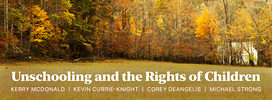Lead Essay
Kerry McDonald says that those who care about liberty should give unschooling a look. Structured education with a fixed curriculum and standardized testing is the product of a bureaucratized system. But children are spontaneous learners, says McDonald, and they do best when adults give opportunities and support rather than structure and evaluation.
Response Essays
Kevin Currie-Knight is a libertarian. He also likes unschooling. But, he says, it’s a mistake to conflate them; either view should stand or fall on its own—political liberty for adults might be the best choice, but this doesn’t imply that unstructured learning is best for children. And unstructured learning may be best for children without implying much of anything about the adult world of politics. While his personal answer to each of these is “yes,” the two are independent questions in his view.
Corey DeAngelis discusses the complicated relationship between unschooling and school choice. While he finds the evidence for school choice persuasive, and while he is also open to unschooling, he sets out several reasons why the two initiatives may not be wholly compatible. He recommends Educational Savings Accounts (ESAs) as potentially flexible enough to offer meaningful help for unschoolers.
Michael Strong considers what society would look like if we schooled less and educated more. While he is supportive of unschooling in principle, not everything of that name is equal, and he cautions that we still have much to learn about learning itself. One thing that seems unlikely to work, though, is spending more and more money on traditional schooling.
Coming Up
Conversation through the end of the month.

